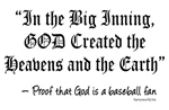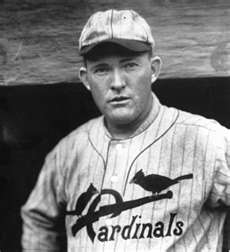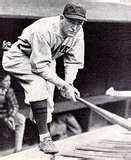He won six batting titles with the Cardinals before being traded to the New York Giants before the 1927 season. He led them to the World Series, where they lost to the Yankees legendary "Murderer's Row". He won the batting title with the Boston Braves in 1928 and went to the Chicago Cubs, where he would stay until he was forced out in 1932. He had constant conflicts with ownership and management and was known for being extremely hard on his players when he managed. So much so, in 1952, when he was fired by onwer Bill Veeck from managing the St Louis Browns (for the second time), his players presented Veeck with a trophy to show their appreciation.
But there were few that played the game as hard as Hornsby did. Very few in the game today could take the responsibility of player-managing Hornsby as well as many others did at that time.
In 1926, while player-managing the Cardinals, he went 3-3, with a single, double and homerun. A sacrifice fly gave him 5 RBIs leading the Cardinals to a 9-3 win over the Pittsburgh Pirates. Lou Wollen of the Pittsburgh Press brilliantly describes how he could put the team on his back, "Manager Rogers Hornsby is an ideal leader. Not only does he pilot the Cardinals in expert fashion, getting all the baseball possible out of his players, but he shows them on the ball field how the game should be played. Yesterday, for instance, he demonstrated the latest approved methods in clouting, leading his club in this department. He batted perfectly and saw his team vanquish the Pittsburgh world's champions by a 9 to 3 score." "The Cardinals wound up by tallying twice in the ninth when Heinie Mueller tripled past Clyde Barnhart in left center and Hornsby smashed a home run to the (450-foot-distant) flagpole in center." (Quotes courtesy of baseball reference.com)
Another example came exactly five years later, when he was the player-manager of the Chicago Cubs. he hit three consecutive homeruns on three different types of pitches, leading the Cubs to a 10-6 victory over the Pirates at Forbes Field. Writer Fred Wertenbach of the Pittsburgh Press put this classic description of how Hornsby carried the Cubs. "For the enlightenment of those fans not among the 15,000 at yesterday's slaughter, the great Rogers crashed three successive long, legitimate and unsullied homers over the distant Forbes Field ramparts, two off Larry French and the third off Claude Willoughby. Mr. French tried to southpaw Hornsby in the third à la screw ball. Two men were on at the time. He pitched a bit low. Hornsby drove it over the left field wall, about the seventh panel up from the scoreboard. The score then became Cubs 3, Pirates 5. In the fifth, Larry faced Hornsby again with two on. 'Huh! He hits 'em low; I'll try one high outside,' Larry reasoned. Bang! The ball cleared the screen in right, and the score in a trice became 6 - 5, Cubs. The sixth frame saw Willoughby, a right-hander, ready to benefit from French's experience, the latter having left the scene. 'This guy hits 'em low, he hits 'em high – my play is to curve him to death,' was the ex-Phillie's logic. Kiki Cuyler was on second. Wham! A curve, waist high, was interrupted as it came up to the plate, and diverted over the scoreboard in left. Two more runs added to the Cub total, making eight driven in by Rogers." (Quotes courtesy of baseballreference.com)
Nobody demanded more out of his players and backed it up by physically doing what he wanted his players to do like Hornsby. Oddly enough, Hornsby had an issue with arguing with umpires. One time he sent a player out to argue a call with an ump, resulting in that player getting ejected. Another time he refused to argue a fan interference call until he was prompted by his owner. He then argued half heartedly after the play was over with.
A .358 lifetime batting average and three .400 batting seasons in the live ball era make a player one of the best ever. He did not compile numbers, spending some his latter player-managing days not playing much at all. It seemed after he stopped being a full-time player, he lacked that ability to get through to his team as a manager, something he could do by playing. That was his "edge" as a manager, the ability to show the players how it it done.
It was amazing how ownership and management and even some players refused to allow themselves to be run by a legend. They did not like his "drill-sergent" personality and the way he talked to people. It seems a little too liberal to me. If I played the game and a guy with that track record was my boss, I'd sure as hell respect what he did and how he accomplished it. And I bet if more players bought into his system, they would have won World Series Championships because Rogers Hornsby is and was a winner.
Relating that to today's game, is it always the manager's fault when a team doesn't get the job done? Absolutely not, which is part of the reason I wrote this article. We live in and always have lived in a society where the immates run the asylum in professional baseball. Even when the players did not get paid much at all, the moral of the team always takes presidence over the plan of the manager. If there are disputes with multiple players and a manager, it is the fault of the manager and they usually get fired. Is Bobby Valentine the problem in Boston? Was there never trouble before he got there? Come on, players today (as well as in the past) need to be put in their place. Unfortunately, it is getting tougher because of the fact that star players make way more that their managers.



 RSS Feed
RSS Feed
